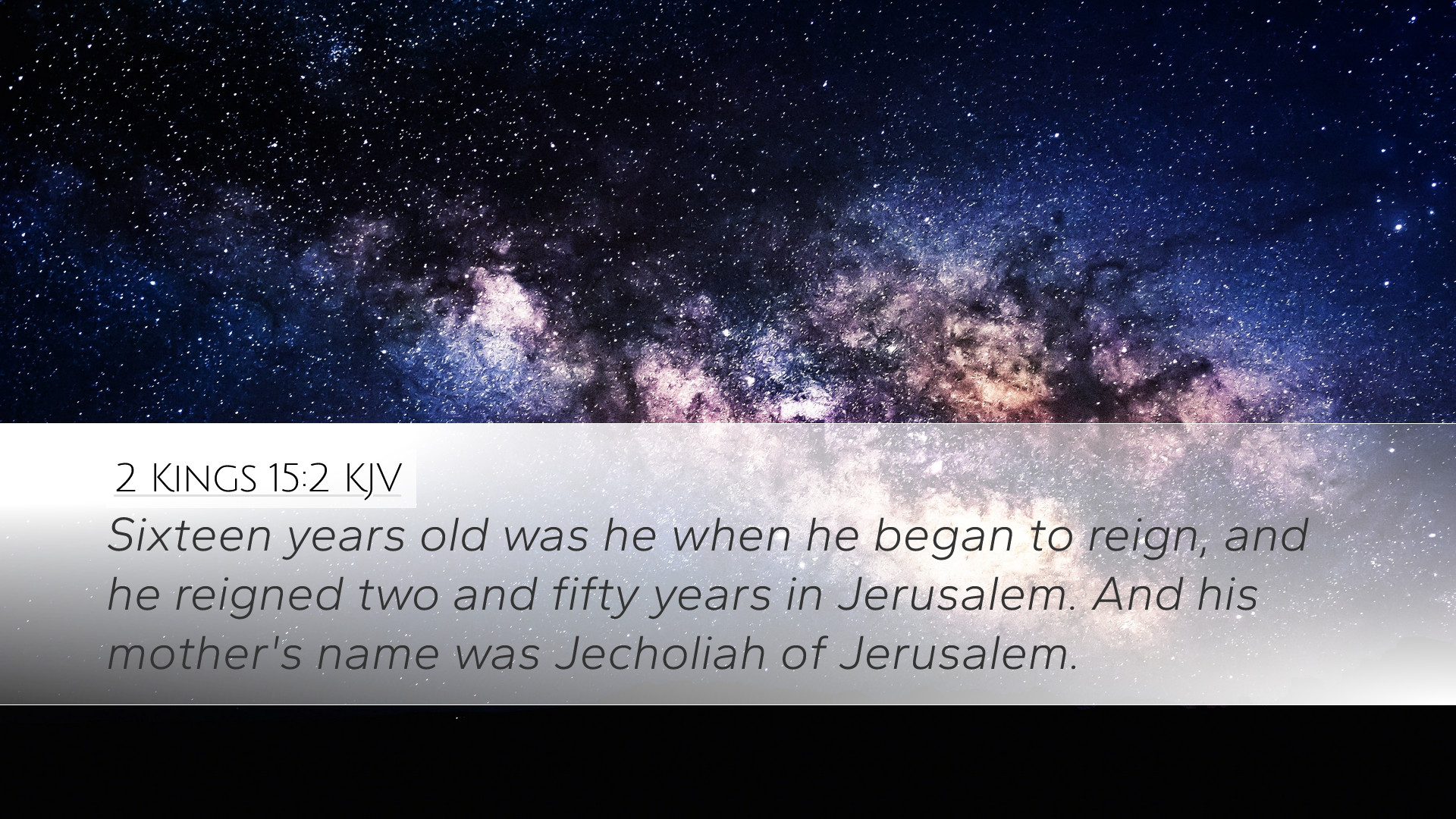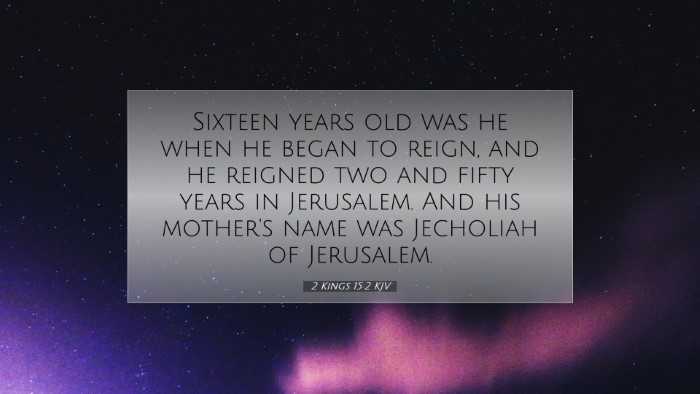Commentary on 2 Kings 15:2
Verse Reference: 2 Kings 15:2 - "He was sixteen years old when he began to reign, and he reigned two and fifty years in Jerusalem. And his mother’s name was Jecoliah, of Jerusalem."
Introduction
The reign of Azariah (or Uzziah) was marked by significant military and economic achievements, as well as a gradual deterioration in spiritual faithfulness in Israel and Judah. This commentary aims to explore the richness of this verse through the insights of Matthew Henry, Albert Barnes, and Adam Clarke.
Examination of the Text
The verse introduces Uzziah, a young ruler who ascended to the throne at a tender age of sixteen. His reign lasted for fifty-two years, which is notably long for a monarch, especially in the turbulent times of the divided kingdom of Israel and Judah.
Age at Ascension
Matthew Henry highlights that Uzziah's youth should not be viewed as a limitation but rather as a divine appointment. Despite his age, he exhibited qualities of leadership that were beneficial for Judah during a time of both challenges and prosperity. Henry emphasizes that early leadership can set a model for future generations.
Albert Barnes comments on the significance of a young king coming to power. It often reflects a transition phase within a nation. Youthful leaders, though sometimes underestimated, can bring fresh perspectives and fervor in governance.
Length of Reign
The detail of Uzziah reigning for fifty-two years is significant as it indicates a period of relative stability in Judah.
Adam Clarke notes that long reigns often correspond with favorable conditions in the kingdom. This longevity suggests Uzziah was generally accepted and, at least in the earlier years, was a blessing for his people.
Mother's Name: Jecoliah
The mention of his mother, Jecoliah, signals the importance of maternal influence in the king's life.
Matthew Henry stresses that the character and example of mothers can greatly impact the destinies of their children, particularly in royal contexts where lineage and heritage play significant roles.
Albert Barnes provides insight into the name 'Jecoliah,' which may mean “Jehovah is able.” This could indicate that the faith and character of his mother influenced Uzziah’s reign and relationship with God.
Theological Implications
The age and the reign of Uzziah present several theological implications for scholars and leaders today:
- Youthful Leadership: The ascendancy of a young leader reminds us that God can empower individuals regardless of age, challenging common stereotypes about leadership effectiveness.
- Divine Sovereignty: The text invites the reader to reflect on God’s control over history and governance. Uzziah's reign, sanctioned by God, highlights this divine providence.
- Legacy and Influence: The mention of Uzziah's mother serves as a reminder that our actions and faith can influence future generations, a concept that is profoundly relevant to today's discussions on mentorship and discipleship.
Historical Context
Uzziah’s reign is situated in a complex historical environment where external threats from nations like Assyria and internal strife within Israel were prominent.
Adam Clarke connects the longevity of Uzziah's reign to a time of both external prosperity and internal challenges, emphasizing that despite a strong military and economic position, spiritual fidelity to God must not be overlooked.
Application for Today's Believers
The lessons from 2 Kings 15:2 are pertinent for modern believers:
- Embrace God’s Calling: Regardless of age or experience, God calls individuals to leadership positions where they can serve His purposes.
- Value of Stability: Long-term leadership can establish a foundation for growth and development, making the case for patience and perseverance in leadership roles.
- The Role of Parents and Mentors: Recognizing the influence of parental guidance on character formation is crucial for believers desiring to cultivate future leaders who honor God.
Conclusion
The commentary on 2 Kings 15:2 challenges pastors, students, theologians, and Bible scholars to consider the implications of Uzziah's early reign, the stability it brought to Judah, and the spiritual insights derived from his mother's influence. As modern-day believers reflect on their own lives and leadership, the lessons within this verse underscore God's ability to use anyone at any stage of life for His glory.


